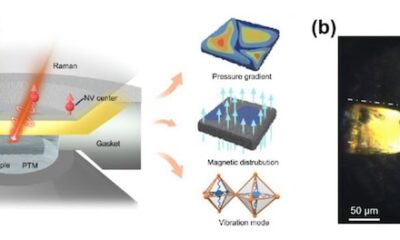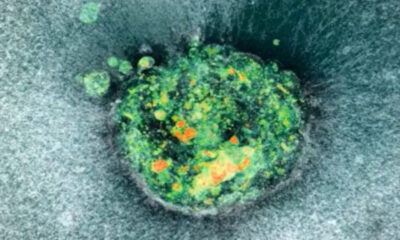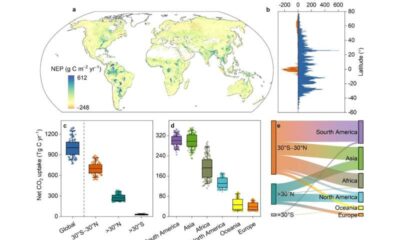Science
Study Reveals Crustal Faulting Fuels Life Deep Underground

Recent research led by scientists from the Chinese Academy of Sciences has fundamentally altered the understanding of life in extreme environments. Published in Science Advances on July 18, 2025, the study reveals that microbes in deep subsurface regions derive energy from chemical reactions triggered by crustal faulting, challenging the long-held notion that all life relies on sunlight.
The research, spearheaded by Prof. He Hongping and Prof. Zhu Jianxi from the Guangzhou Institute of Geochemistry, highlights the presence of a vibrant biosphere in areas previously deemed uninhabitable due to the lack of light and organic material. These subsurface microbes thrive by harnessing energy from abiotic redox reactions that occur during interactions between water and rock.
In the study, the researchers focused on how these microorganisms utilize hydrogen (H2) as their primary energy source, alongside oxidants that facilitate metabolic functions. While the origins of these oxidants were not well understood, the team simulated crustal faulting activities to investigate. Their findings revealed that during rock fracturing, free radicals can decompose water, resulting in the production of hydrogen and oxidants like hydrogen peroxide (H2O2).
This discovery is significant as it establishes a distinct redox gradient within fracture systems. These gradients can interact with iron (Fe) present in groundwater and rocks, influencing various redox reactions. Depending on local conditions, these reactions can either oxidize ferrous iron (Fe2+) to ferric iron (Fe3+) or reduce ferric iron back to ferrous iron.
The research team found that hydrogen production associated with earthquake-related faulting is remarkably high, exceeding levels from alternative processes, such as serpentinization and radiolysis, by as much as 100,000 times. This process plays a crucial role in driving the iron redox cycle, which subsequently impacts the geochemical processes of key elements, including carbon, nitrogen, and sulfur. Such interactions are vital in sustaining microbial metabolism deep beneath the Earth’s surface.
Professors He and Zhu also raised the intriguing possibility that similar fracture systems on other Earth-like planets may harbor conditions suitable for extraterrestrial life. Their research opens new pathways for exploring the potential for life beyond our planet, suggesting that subsurface environments may be more hospitable than previously believed.
The findings of this study not only enhance the understanding of deep subsurface ecosystems but also underscore the complexity of life forms that thrive in extreme conditions. As scientists continue to unravel the mysteries of these hidden biospheres, the implications for astrobiology and the search for life beyond Earth become increasingly significant.
This study serves as a reminder that life can persist in the most unexpected places, challenging assumptions about the fundamental requirements for survival. For more detailed information, refer to the original research article: Xiao Wu et al, “Crustal faulting drives biological redox cycling in the deep subsurface,” published in Science Advances (2025). DOI: 10.1126/sciadv.adx5372.
-

 World2 weeks ago
World2 weeks agoCoronation Street’s Shocking Murder Twist Reveals Family Secrets
-

 Entertainment1 week ago
Entertainment1 week agoAndrew Pierce Confirms Departure from ITV’s Good Morning Britain
-

 Entertainment5 months ago
Entertainment5 months agoKate Garraway Sells £2 Million Home Amid Financial Struggles
-

 Entertainment4 months ago
Entertainment4 months agoAnn Ming Reflects on ITV’s ‘I Fought the Law’ Drama
-

 Entertainment1 month ago
Entertainment1 month agoCoronation Street Fans React as Todd Faces Heartbreaking Choice
-

 Health4 months ago
Health4 months agoKatie Price Faces New Health Concerns After Cancer Symptoms Resurface
-

 World1 month ago
World1 month agoBailey Announces Heartbreaking Split from Rebecca After Reunion
-

 Entertainment2 weeks ago
Entertainment2 weeks agoTwo Stars Evicted from I’m A Celebrity Just Days Before Finale
-

 World2 weeks ago
World2 weeks agoKevin Sinfield Exceeds Fundraising Goal Ahead of Final Marathons
-

 Entertainment4 months ago
Entertainment4 months agoCoronation Street’s Carl Webster Faces Trouble with New Affairs
-

 Entertainment3 months ago
Entertainment3 months agoWhere is Tinder Swindler Simon Leviev? Latest Updates Revealed
-

 Entertainment5 months ago
Entertainment5 months agoMarkiplier Addresses AI Controversy During Livestream Response





















